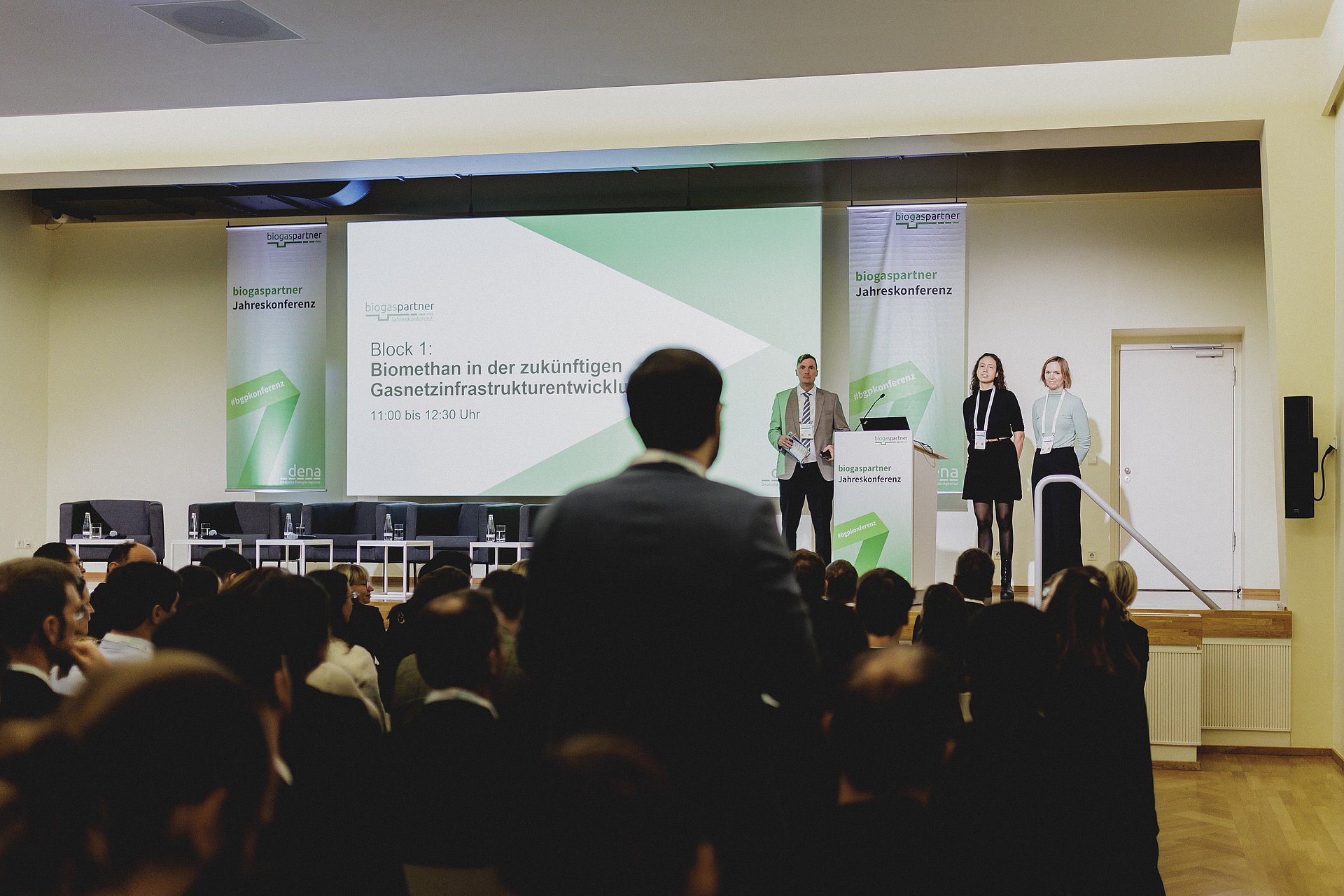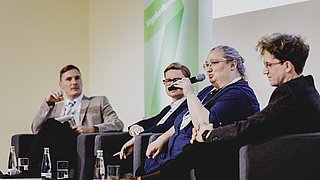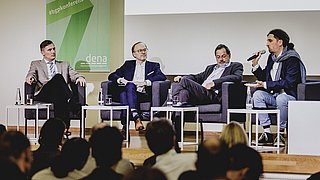Annual conference 2024
Session I: Biomethane in future gas grid infrastructure development
In the first block, Dr. Shalene Edwards and Johanna Jagnow (speakers WEW3, BMWK) presented the development of the EU internal gas market package, which for the first time creates a comprehensive legal framework for the hydrogen market until 2026 and builds on existing natural gas regulations. The challenges include the falling demand for gas and the future use of gas distribution networks, with options such as switching to hydrogen or using it for biomethane being examined in order to ensure a predictable and cost-efficient supply in the long term.
According to Ralph Kemp (Partner, Büro für Energiewirtschaft und technische Planung - BET), the future of gas distribution networks faces significant challenges, as demand for methane is declining due to electrification and the hydrogen ramp-up, while the role of biomethane could focus on sectors that are difficult to decarbonize, such as industry and old building heating systems. According to Mr. Kemp, rapid planning security and the creation of regional clusters and marketplaces are necessary to avoid rising grid and operating costs through targeted infrastructure transformation and adaptation to local heating plans.
Tobias Ziereis (Sales Director, AB Energy Germany) also gave an overview of current biomethane plant construction. Ziereis emphasized that the expansion of biomethane plants is currently stagnating despite potentially high demand, as legal uncertainties, long implementation times for grid connections and high costs in Germany have an inhibiting effect compared to neighboring countries such as Austria and Switzerland. Smaller plants face particular obstacles due to regulatory requirements and low incentives for CO₂ utilization, which makes the development of decentrally available biomass more difficult and often makes easy-to-use but expensive gas infrastructure solutions less attractive compared to district heating.

Presentations
- Infrastructure developments for biomethane from the perspective of the BMWK (german) Dr. Shalene Edwards und Johanna Jagnow, Consultants WEW3, Federal Ministry of Economic Affairs and Climate Action (BMWK) 533.69 KB pdf th
- Green grids: Challenges and opportunities of gas distribution with biomethane (german) Ralph Kremp, Partner, Büro für Energiewirtschaft und technische Planung (BET) 1.83 MB pdf th
- Overview of current biomethane plant construction (german) Tobias Ziereis, Sales Director, AB Energy Germany 1.56 MB pdf th
Session II: Trading and accounting of biomethane
Thorsten Nascimento Rohling (Managing Director and Head of Product Development, agriportance) provided an update on the trade and import of biomethane. According to the EBA, the European biomethane market is growing annually, with increasing cross-border trading activities, whereby the fuel sector has dominated in recent years. Despite a temporary competitiveness of biomethane with natural gas in 2022, the biomethane price has currently fallen due to the insolvency of some traders, among other things, leading to uncertainties and a saturated market. Biomethane production from the Netherlands, the UK and Switzerland appears particularly promising for achieving the target of generating around 35 TWh of biomethane by 2030.
Nina Gutsche (Consultant 523, BLE) presented the legal requirements for issuing sustainability certificates. The BLE is currently working on restructuring Nabisy for emissions trading in order to ensure a clear origin of gas in the database, particularly in view of the increase in sustainability certificates due to the introduction of RED II. Certificates are currently issued on a quarterly basis to reduce bureaucracy, but the issue of annual verification is still under discussion while Nabisy awaits a possible bilateral connection to the Union database.
Jakob Jegal (Senior Expert Renewable Energies, dena) emphasized that the parallel verification process for biomethane in the Renewable Energies Law (EEG) and other systems such as Nabisy represents a major challenge, as different criteria and verifications must be met, which leads to bureaucratic effort and inconsistent verification. Efforts are being made to optimize the verification process through the exchange between the verification systems and a possible automated comparison, whereby the introduction of a uniform identifier and the harmonization of processes are being sought. However, it is still unclear whether the Union Database (UDB) and other databases will be able to offer a standardized solution in the future.

Presentations
- News on the trade and import of biomethane (german) Thorsten Nascimento Rohling, Managing Director and Head of Product Development, agriportance 1.74 MB pdf th
- Legal requirements for issuing sustainability certificates (german) Nina Gutsche, Consultant 523, Federal Office for Agriculture and Food (BLE ) 695.91 KB pdf th
- Challenges of parallel detection systems for biomethane in the EEG (german) Jakob Jegal, Senior exper Renewable Energies, dena 1.17 MB pdf th
Session III: Sales prospects for biomethane in the electricity and heating sector
According to Dr. Andreas Täuber (Head of Department 524, BMEL), the future of bioenergy is facing challenges, especially when it comes to integrating biomethane and biogas into the energy transition. Topics such as the postponed National Biomass Strategy (NABIS), the introduction of stricter greenhouse gas requirements (e.g. RED III) and the planned flexibilization of biogas plants to stabilize the grid are currently being discussed in an intensive exchange between the ministry and all relevant stakeholders. The use of residual materials and an increased circular economy play a central role here, as do issues relating to certification and integrity in the import market. The focus is also on the biomass package to ensure the preservation and expansion of bioenergy despite expiring subsidies. According to Dr. Tauber, the future of the industry depends heavily on political decisions and the further development of technological solutions to ensure long-term energy independence and sustainability.
Prof. Dr. Uwe Holzhammer (Institute Director ForTraNN, TH Ingolstadt) then spoke about the integration of biomethane in highly flexible CHP plants as a way of supporting residual load coverage and making the energy system more flexible. Although the concept appeared to be particularly promising when used as a supplementary heat source for flow heat pumps in district heating solutions, its implementation is currently still being held back by rising market prices for biomethane, uncertain yields and complex framework conditions. In order to improve cost-effectiveness and efficiency, approaches such as the use of natural gas storage at the exit point, targeted operating strategies and coupling with heat yields are proposed by Prof. Dr. Holzhammer's research team, whereby future success also depends largely on political decisions on funding and adapting the legal framework.
Dr. Norbert Azuma-Dicke (Head of Strategy and Policy, BDH) gave an overview of biomethane in gas-based heat generation under the Building Energy Act (GEG) and the Heat Planning Act (WPG). It emerged that biomethane will play an important role in existing buildings due to the high number of gas heating systems and low renovation rates. However, the existing regulatory framework is causing uncertainty among consumers, as responsibility for heat planning lies with the local authorities. A clear development strategy is therefore required on the part of the federal government.
Finally, Norman Wendt (Senior Consultant, von Beust & Coll. Beratungsgesellschaft) presented the green gas quota initiative as a perspective for renewable gases. The industrial alliance is working towards the introduction of a green gas quota in order to offer investors long-term security in the field of green gases. A concrete implementation proposal is not yet available, but the aim is to achieve a cross-technology and cross-sector solution by 2045. The cross-sector approach is intended to raise public and political awareness of the need for the quota and gain supporters.

Presentations
- The future of bioenergy from the perspective of the BMEL (german) Dr. Andreas Täuber, head of department 524, Federal Ministry of Food and Agriculture (BMEL) 610.01 KB pdf th
- Biomethane in highly flexible CHP (german) Prof. Dr. Uwe Holzhammer, Institute Director ForTraNN, TH Ingolstadt 2.60 MB pdf th
- Biomethane in gas-based heat generation under the Building Energy Act and the Heat Planning Act (german) Dr. Norbert Azuma-Dicke, Head of Strategy and Policy, Federal association of the german heating industry (BDH) 1.36 MB pdf th
- Green gas quota initiative - a perspective for renewable gases (german) Norman Wendt, Senior Consultant, von Beust & Coll. consulting company 490.86 KB pdf th